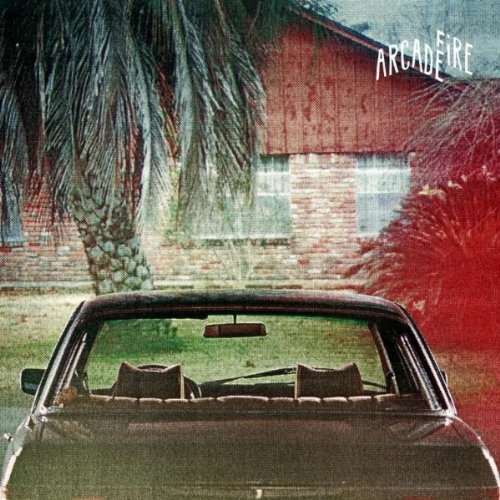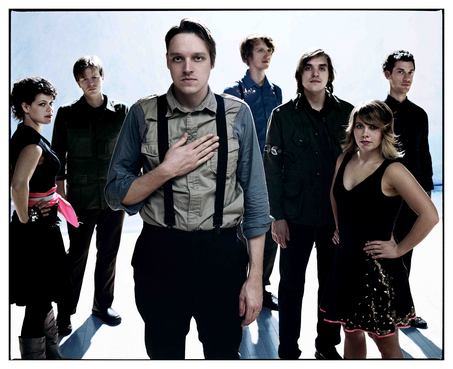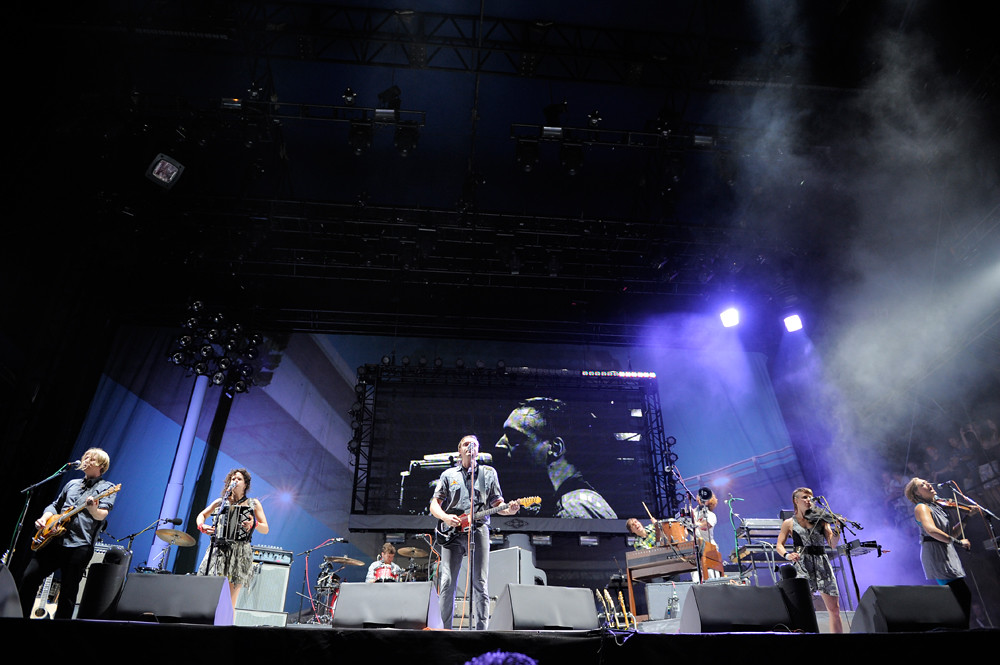Arcade Fire
The Suburbs
@@@@1/2
In many respects, Arcade Fire seem to be poised on the precipice of--or may have already made the jump into--rock 'n' roll mega-stardom.
A level of popularity achieved by relatively few rock acts, especially at a time when musical tastes are more fragmented than ever and mainstream success is often transient at best, it is defined by multi-platinum album sales and sold out arena shows, high-profile slots headlining major festivals and ultimately, for the biggest of the big, concert tours that fill football stadiums. More intangibly, it is about becoming seemingly ubiquitous in the modern zeitgeist, as likely to be playing on the iPhones of thirtysomethings on their way to work as displayed on t-shirts in high school hallways. And while mass success and critical favor are often mutually exclusive, or at least not achieved in unison, many of the acts who have reached the strata that Arcade Fire may now be entering--U2, Radiohead, Coldplay--have similarly enjoyed both respect and riches.
The Montreal-based band's excellent third album, The Suburbs, was preceded by a considerable amount of hype and dozens of rave reviews. The album currently has a composite Metacritic score of 86 that I feel is about right; I've been wavering between @@@@ and the @@@@1/2 that I awarded. It is an extremely accomplished album, and one that I've enjoyed listening to several times over the past two weeks, but perhaps akin to my infrequent revisiting of their first two albums, it may not be a work compelling enough to long remain in my regular rotation. It's quite good, but I don't think it's near the level of The Joshua Tree, Nevermind or Born to Run, although it can't fairly judged in those terms this soon.
I'll get back to some subjective commentary in a bit, but as evidence of Arcade Fire's escalation in popularity, within the same week that the new album was released, the band played two sold-out shows at New York City's famed Madison Square Garden--the second of which was streamed live on YouTube-- and according to friends, attracted a crowd on the closing Sunday night of Lollapalooza that was as big if not bigger than a reunited Soundgarden.
In its first week of release, The Suburbs went straight to number one on the Billboard charts, selling 156,000 copies in the United States. It was also #1 in Canada--not surprising for a Montreal-based band, although lead singer Win Butler and his guitarist brother Will's upbringing in the suburbs of Houston prompted the album's theme--and the United Kingdom, where the band just announced a December arena tour.
But while going to #1 is impressive for anyone, particularly a band that still officially qualifies as "indie"--it's signed to Merge Records--and it doesn't appear anyone will have to "pass the hat" for Arcade Fire anytime soon, a closer look at the sales figures shows that the band may not be quite so mega just yet, and that perhaps as a corollary, "mainstream popularity" may largely be a pinnacle of the past for modern artists of a rock ilk (still my personal preference).
Keeping in mind that album sales are not the only barometer of popularity, and that until now Arcade Fire has been bigger in terms of press and buzz than in units shipped or downloaded--their first two albums have sold only 1 million copies combined--the reality is that 156,000 in first week sales is 7,000 copies short of the preceding week's #1 debut by Avenged Sevenfold, an album that didn't received the type of adoring press that preceded The Suburbs. It it also only about 20% of 2010's top first week sales leader, Eminem's Recovery, which sold 741,000 (it has eclipsed 2 million in 8 weeks and per some reports, is likely to overtake Arcade Fire this week by a 3-to-1 margin).
Against the "break really, really big" album of other bands seemingly at similar points in their careers, The Suburbs also comes up somewhat surprisingly short in initial week sales. Coldplay's X&Y, likewise their third album, sold 737,000 week one copies in the U.S. The Killers' second album, Sam's Town, sold 315,000 and though their next one, Day & Age only debuted at #6, it sold 193,000 copies in week one. Radiohead's Kid A, which followed OK Computer but was relatively experimental, sold 210,000 units in the U.S. in its first week, and back in 1995, The Smashing Pumpkins double CD set, Mellon Collie and the Infinite Sadness, opened with 246,000 albums sold.
Certainly, times are different than they were even a few years ago. In a recent Time magazine article, Pitchfork.com editor Scott Plagenhoef is quoted as saying, "There isn't really such a thing as mainstream rock anymore." The same article reveals that in 2009, only 11 artists released new albums that received a platinum certification (representing 1 million albums sold) from the Recording Industry Association of America; as recently as 2006, there were 56. It also states that whereas 50,000 albums were released in the U.S. in 2005, that number had risen to nearly 100,000 in 2009.
But though it would seemingly be easy to say that the segmentation of today's music purchasers--coupled with the increased prominence of people buying only single songs from iTunes and a good number undoubtedly still downloading music for free--readily explains the relatively low sales burst for The Suburbs, the album also benefited a great deal from modern technology, including an Amazon promotion
Also, though few purveyors of the lyrical, guitar-driven rock that I most relish have established, built and maintained mainstream American relevance in the '00s--to varying degrees of success and personal preference, I think only Coldplay, The Killers, The White Stripes, Kings of Leon and Muse really qualify; album & concert sales show Nickelback to be rather huge, but I've never heard a single person, whether friend or critic, who claims to like them--acts like Lady Gaga, Taylor Swift and the Black Eyed Peas have clearly broken through to mega-stardom. And beyond Eminem's huge sales, artists as disparate as rapper Drake and country band Lady Antebellum have sold over 450,000 albums in their first week out over the past few months. Album sales may be way down, but some acts still sell them in bunches.
I'm not saying any of this should be held against Arcade Fire. Although I don't yet consider them a historically great band--I didn't include them in a recent ranking of My 100 All-Time Favorite Artists of Popular Music--and probably don't like any of their three albums quite as much as many others do, I consider them not only one of the best of today's bands, but probably the one on the biggest upswing. Unlike years back, not many artists build from one album to the next the way Arcade Fire has; most get some pub for a critical lauded album in a given year, but don't manage to maintain popular interest (or particularly my own) one or two more records down the road.
In terms of looking forward to seeing them live--I never have, other than the recent YouTube stream--, anticipating future albums and following their ascent to super-stardom, no matter how high or low its apex, The Arcade Fire excite me more than The National, MGMT, Phoenix, LCD Soundsystem, The Hold Steady, Death Cab for Cutie or other relatively recent quasi-rock acts that have garnered some acclaim and popularity (and these are among those that I somewhat like). I don't think they're as good as The Killers, in terms of the best bands of current vintage, and I even prefer some smaller acts that I've heard out of England (this year, the Len Price 3; Maximo Park over the last five).
So I suggest you give The Suburbs a listen; if you don't want to buy it you can hear it in full on MySpace Music. It probably won't be the best album you've ever heard; at an hour in length it can drag in spots, and even after listening while reading through the lyrics, any great profundity about growing up in the suburbs is largely lost on me (although "We Used To Wait" makes an observational statement that I endorse). But especially if you give it some time, you may agree that it's one of few new things in a rock 'n' roll vein worth tapping into.
And that's saying something, for if one looks at the chart at left, of the top concert tours of the first half of 2010, not only is it largely devoid of any new rock acts (except Muse), one really has to wonder who will be filling arenas 10 years from now. Maybe it will be Arcade Fire, but even that seems like an uncertain bet.
(The video below is Ready To Start, my pick as the best song on The Suburbs, taken from the recent concert streamed from New York, where it opened the show.)





2 comments:
These guys are currently my favorite band on the planet. "The Suburbs" was a brilliant album, every bit as good as their first two (which were wonderful as well). Just great stuff (and better than "Nevermind", by the way). Glad you're a fan.
Side Note: "The Joshua Tree" isn't even U2's best album. That would be "Achtung Baby".
G1000, thanks for the comment. Lots of people with great musical tastes are absolutely loving Arcade Fire, but I'm a bit wary about their staying power (to me personally; e.g. I still can't remember which Neighborhood song is which). So I gotta disagree about Suburbs being better than Nevermind, on which every cut is great (although I actually think In Utero is a more accomplished Nirvana album).
I enjoyed looking at your blog and reading your take on movies. I'm on a foreign film exploration and should post about it soon. If you're in the Chicago area, you may like the Film Meetup group I attend (www.meetup.com/movies-616)
Post a Comment